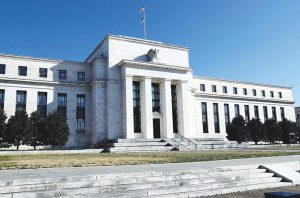BLOOMBERG
The Federal Reserve’s decision to raise interest rates once again while keeping its year-end forecast unchanged is set to keep Asian stocks under pressure and help government bonds rally, according to regional-focussed investors and strategists.
A weaker dollar will help bolster emerging-market currencies and may also provide some relief for Asian equity markets, which will otherwise mirror weaker risk appetite seen in the US, the analysts said in comments to Bloomberg.
Asian assets may also move on comments from Treasury Secretary Janet Yellen who said regulators aren’t looking to provide “blanket†deposit insurance to stabilise the US banking system without working with lawmakers.
“Asian markets will likely take the lead from the US, so bonds up, stocks down, although the weakness in Asian equities might be tempered by a weaker US dollar,†Chamath De Silva, a senior fund manager for Betashares Holdings in Sydney said, pointing to the risk-off tone across global markets.
“The big end-of-cycle rallies in bonds have generally followed a pause and the fact that the dots weren’t revised higher and Powell acknowledged that a pause might come in the near term basically gave investors the green light to add duration,†he said.
“This was further supported by the Powell implying that financial conditions might tighten via a credit contraction from the banking channel, further reducing the need for additional rate hikes,†De Silva added.
Kellie Wood, deputy head of fixed income at Schroders Plc in Sydney said, the mood across markets will be risk-off given credit fears. “Look for higher yields to get longer rates. We also added credit protection to position for a greater risk of recession being priced into credit markets.â€
“We have been positioned for the end of the policy cycle with a greater risk of recession. We got the acknowledgment from Jerome Powell that tighter credit conditions will do a better job of slowing the economy than rate hikes,†said Wood.
“Smaller banks are likely to face a flight of deposits†following Yellen’s “180-degree change in her comments about covering the uninsured deposits,†said Redmond Wong, strategist at Saxo Capital Markets HK Ltd.
“Bank lending will slow further or even contract and bring about a recession. Treasury yields may fall further and Treasuries, in particular the front end of the curve, are a buy. Gold is a buy. Banks stocks may tumble more. Asian stocks, especially financials, will be under pressure,†he said.
“A-shares will do better than Hong Kong as the latter has more exposure to financials. China technology and consumption names, after some initial selloff, may outperform. I would avoid financials and companies with a lot of US dollar debts,†he added.
“Now the major risk event is out of the way, risk-tone can improve through the day.†There’s a “little bit of runway here for financial stability concerns to fade and for USD pressure to continue,†John Bromhead, a strategist at Australia & New Zealand Banking Group Ltd in Sydney said.
“The Asian market will likely go through a direction-searching journey ahead to reprice the more dire outlook. The real risk facing Asian markets is in the unusually wide range of negative possibilities and the Fed’s outlook just underscored this complexity,†said Chotaro Morita, chief rates strategist at SMBC Nikko Securities Inc. in Tokyo.
Morita said, “there’s almost no chance for the Bank of Japan to alter its yield-curve-control program when Kazuo Ueda presides his first meeting as governor in April†given the uncertainties facing the Fed in future meetings.
“Depending on the market situation next month, BOJ policy members may even deliberately avoid talking about the yield-curve-control side-effects altogether. If that happens, expectations of a June policy tweak could also disappear. Bets on a YCC tweak may be unwound further in a larger scale.â€
 The Gulf Time Newspaper One of the finest business newspapers in the UAE brought to you by our professional writers and editors.
The Gulf Time Newspaper One of the finest business newspapers in the UAE brought to you by our professional writers and editors.
